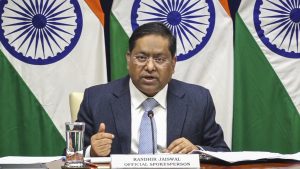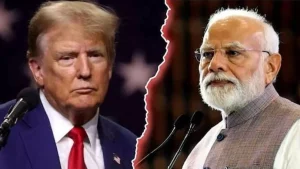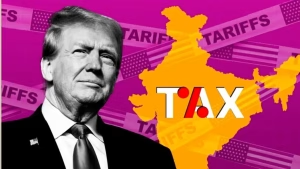New Delhi – US President Donald Trump made controversial statements on October 16, claiming that Prime Minister Narendra Modi promised to halt Russian oil purchases during a phone conversation. However, India’s government has firmly denied that any such discussion took place, marking another chapter in the complex Trump Modi Russia oil saga that continues to impact bilateral relations.
India Denies Alleged Phone Conversation

The Trump Modi Russia oil controversy intensified when India’s Ministry of External Affairs issued a clear statement refuting the American President’s claims. MEA spokesperson Randhir Jaiswal asserted India’s sovereign decision-making authority, stating that the country’s import policies prioritize safeguarding Indian consumers’ interests amid volatile energy markets. The denial came swiftly after Trump’s public assertions about Modi’s alleged commitment.
Trump claimed during his remarks, “I was not happy that India was buying oil. And he (Modi) assured me today that they will not be buying oil from Russia. That’s a big stop.” This statement about the Trump Modi Russia oil issue raised immediate questions in New Delhi, prompting the government’s decisive response.
The Political Career Jibe


In what many observers described as characteristic Trump rhetoric, the US President added a personal dimension to the Trump Modi Russia oil debate. He stated he didn’t want to “destroy [Modi’s] political career” while simultaneously praising the Indian leader as a “great friend” who “loves Trump.”
Trump’s comments contained a factual error, incorrectly claiming India had new leadership annually before Modi’s tenure. In reality, Modi’s BJP-led NDA government has ruled for eleven years, succeeding Manmohan Singh’s ten-year Congress-led UPA regime.
Russia Oil Purchases: The Background
The Trump Modi Russia oil controversy stems from India’s dramatically increased petroleum imports from Russia following the 2022 Ukraine conflict. Traditionally dependent on Middle Eastern suppliers, India multiplied its Russian oil purchases after Western sanctions made Russian crude available at substantial discounts.
India’s Russian oil imports surged from under one percent to nearly forty percent of total crude imports within a short period. As the world’s third-largest oil importer, India justified these purchases as economically necessary for protecting consumer interests. The Trump Modi Russia oil purchases remain contentious, with Washington claiming they fund Vladimir Putin’s war efforts.
Trade Tensions and Tariff Threats

The Trump Modi Russia oil issue intertwines with ongoing trade negotiations between the two nations. The United States has imposed fifty percent tariffs on India, citing Russian oil purchases as justification for half of these duties. India remains the second-largest buyer of Russian fossil fuels after China.
During recent remarks, Trump connected the Trump Modi Russia oil situation with his broader tariff strategy. He threatened both India and Pakistan with tariffs ranging from one hundred to two hundred percent during their recent military tensions, claiming this approach resolved conflicts within twenty-four hours.
India’s Measured Response Strategy
Despite the escalating Trump Modi Russia oil rhetoric, India has maintained diplomatic composure. The MEA statement emphasized ongoing discussions with Washington regarding energy cooperation, noting that India has sought to expand American energy procurement for many years.
“Where the US is concerned, we have for many years sought to expand our energy procurement. This has steadily progressed in the last decade. The current Administration has shown interest in deepening energy cooperation with India. Discussions are ongoing,” the official response stated.
Domestically, Prime Minister Modi has stressed the importance of “aatmanirbhar” (self-reliance) and “swadeshi” (indigenous) products, avoiding direct confrontation over Trump’s claims.
The Nobel Peace Prize Factor
Political analysts suggest Trump’s frustration regarding the Trump Modi Russia oil issue may partly stem from Modi’s reluctance to endorse his Nobel Peace Prize nomination. Unlike Pakistan’s Prime Minister Shehbaz Sharif, who publicly praised Trump at the Gaza Peace Summit in Egypt, Modi has remained neutral.
Trump has repeatedly claimed—over fifty times—that he stopped a potentially nuclear India-Pakistan war in May. India denies acting under US pressure, stating it halted operations based on Pakistan’s request, not American intervention.
Mixed Signals and Ongoing Diplomacy
The Trump Modi Russia oil controversy reflects broader complexities in US-India relations. Despite harsh public statements, Trump recently sent Modi a framed photograph with the handwritten message: “Mr Prime Minister, you are great!”
An Indian delegation remains in the United States for the sixth round of trade negotiations, even as the Trump Modi Russia oil debate continues. India maintains red lines on issues like agricultural imports, with Modi refusing to compromise farmers’ interests.
Conclusion
The Trump Modi Russia oil controversy highlights tensions between strategic partnerships and economic realities. While Trump’s claims about Modi’s promises remain disputed, both nations continue diplomatic engagement. India’s firm denial and emphasis on sovereign decision-making demonstrate its commitment to independent foreign policy, even amid American pressure. As trade talks progress, the resolution of the Trump Modi Russia oil issue will significantly impact bilateral relations moving forward.

